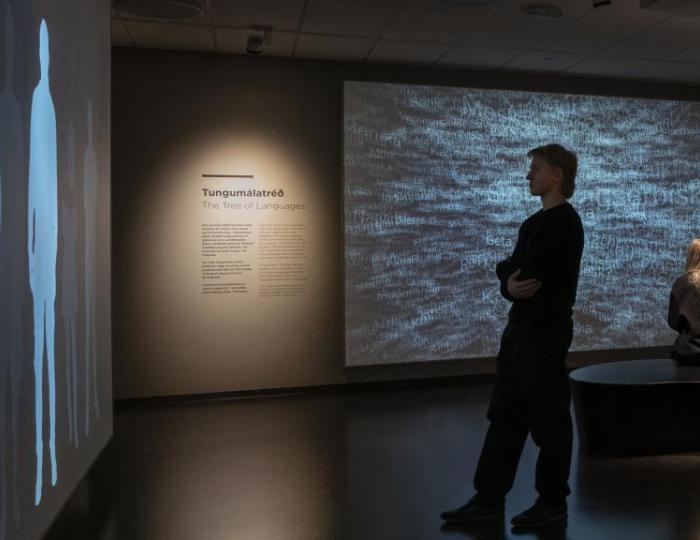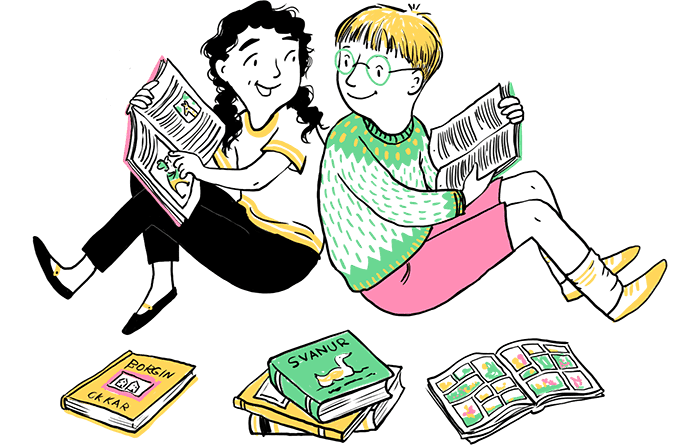English translation
Hi! The English site is only a beta for now and still has many errors (especially in names and locations).
We are working hard to fix them and making more content available than ever before so expect constant updates.
Reykjavík was designated a UNESCO City of Literature in 2011. It is a central hub in the city's literary arts and connects with the international literary community as part of UNESCO's rapidly expanding Creative Cities Network.
Reykjavík, a UNESCO City of Literature, engages with all the major literary events in the city, assists new authors, and provides both counseling and support for individual and larger, more complex projects. Those involved in the literary arts are welcome to approach the City of Literature, whether they're considering collaboration or seeking information.
Reykjavík is the capital and essentially the only city in the country, playing a key role in all aspects of cultural life. The country's main cultural institutions are in Reykjavík, and the arts thrive here, with the city being known as a creative city with active grassroots engagement.
Most of the nation's authors live and work in the capital area, and the city also serves as the backdrop for a large portion of contemporary literature, a trend that has grown with the city's rapid expansion over the past 100 years.

Medieval Icelandic literature is preserved in Reykjavík, including the manuscripts of the Sagas of Icelanders and Eddaic poems, which have made Iceland one of the most renowned literary nations in the world. This literary heritage forms the core of the nation's identity, and the art of storytelling is the most potent thread in its cultural history.
The Árni Magnússon Institute for Icelandic Studies is the center for medieval literature. The institute preserves manuscripts, conducts research on them, and makes them accessible to the public, in addition to providing research facilities and teaching for both domestic and foreign scholars.
The Árni Magnússon Manuscript Collection, preserved by the Árni Magnússon Institute in Reykjavík and the Arnamagnæan Collection in Copenhagen, was added to the UNESCO Memory of the World Register in 2009.

Iceland is among the smaller language areas in the world, with only about 370,000 residents, and few speak the language beyond its borders. The language is one of the nation's distinct features; Icelandic has changed much less than other Nordic languages since the country's settlement, allowing modern Icelanders to read the medieval literature without significant difficulty.
Nowhere else in Europe is the history of literature as uninterrupted in this regard. Literature plays a crucial role in the preservation and development of the language, including both original works and translations. The language is particularly rejuvenated through poetry and fiction, and translations have also been vital in keeping this thousand-year-old literary language alive.

The Reykjavík International Literary Festival was first held in 1985 and takes place biennially.
Many renowned authors have been guests at the festival, such as A.S. Byatt, Kurt Vonnegut, Günter Grass, Isabel Allende, J.M. Coetzee, Margaret Atwood, Paul Auster, Haruki Murakami, Ngugi wa Thiong’o, Seamus Heaney, Svetlana Alexievich, and Taslima Nasrin.
An International Children's Literature Festival has also been held in the city biennially since 2001. Literature is always a part of the Reykjavík Arts Festival's schedule, as it is for city festivals such as Culture Night, the Winter Lights Festival, and the Children's Culture Festival.
A wealth of literary events are offered throughout the year in Reykjavík. Cultural institutions, schools, associations, and various private entities often collaborate to offer these events.
Regular happenings include the Week of the Book in April, literary walks by the City Library, conferences and symposiums organized by the University of Iceland and others, as well as numerous poetry events hosted by poets and grassroots organizations.
Participation in cultural events is high, with surveys showing that more than half of the nation takes part in various types of cultural events.
Many Icelandic authors have received international recognition for their works. Halldór Laxness was awarded the Nobel Prize in Literature in 1955 for his 'vivid epic narrative that has renewed the great narrative art of Iceland'. At Gljúfrasteinn, where the poet lived for more than half a century, there is now a museum open to the public year-round.
Among the authors who have received the Nordic Council's Literature Prize are Thor Vilhjálmsson, Einar Már Guðmundsson, Fríða Á. Sigurðardóttir, and Sjón, while several Icelandic authors have won the Nordic Children's Book Prize, such as Guðrún Helgadóttir, Kristín Steinsdóttir, Ragnheiður Gestsdóttir, and Áslaug Jónsdóttir.
Arnaldur Indriðason has received the Gold Dagger award and other international crime fiction prizes, Andri Snær Magnason has been honored with the Kairos Prize, Guðbergur Bergsson and Einar Már Guðmundsson have received the Swedish Academy's Nordic Prize, and Auður Ava Ólafsdóttir has won the Prix de Page, to name a few. Contemporary Icelandic poetry and prose are increasingly being translated into other languages.

Reykjavík City Library is the largest public library in the country. The library offers a variety of services and supports literature and reading in many ways.
The National Library of Iceland is located in Reykjavík and houses all published material in Iceland as well as systematically collecting manuscripts, including those from Icelandic authors.
Libraries in Iceland share a common library system, Leitir, in addition to national electronic access to databases that all citizens can use free of charge.

The Vigdís International Center for Multilingualism and Intercultural Understanding operates at the University of Iceland in Reykjavík.
It is established under an agreement between the Icelandic authorities and UNESCO. This interdisciplinary hub fosters research and knowledge dissemination in cultural and linguistic studies, native language cultivation, and language policy, promoting partnerships with institutions and individuals globally, with an emphasis on North-South cooperation.
The center supports UNESCO's goals of multilingualism and linguistic diversity, contributing to policy making, knowledge exploration, and education in the fields of languages and culture.

Nearly nowhere else in the world are there as many titles published per capita as in Iceland. According to statistics from Statistics Iceland, five titles are published per 1,000 residents compared to 2-2.5 titles found in other Nordic countries.
To put it in context, an average print run of 1,000 copies for a novel in Iceland is akin to one million copies in the United States. Most of the country's publishing houses are based in the capital area.

One could argue that the Christmas Book Flood represents one of the nation's largest reading initiatives.
This period, starting in late fall and leading up to Christmas, is marked by a surge in book publishing. Publishers, libraries, various institutions, community groups, and the authors themselves all engage in a spirited competition to promote their works.
Books remain one of the most popular Christmas gifts, and during this season, discussions about books are more prevalent than at any other time of year.

Reykjavík was designated a UNESCO City of Literature in 2011.
You can contact us by sending an email to bokmenntaborgin@reykjavik.is